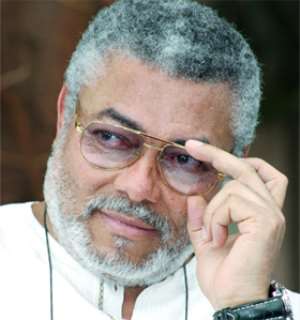
Accra, May 9, GNA - Former President Jerry John Rawlings, on Monday asked Government not to consider the opposition as an enemy ,since democracy was about providing space for opposition political parties to operate.
He said: “In the politics of some countries, you are either a political friend or an enemy; there are no shades of grey in between.
“This sort of mindset is exacerbated by the mentality – and the actual experience in so many instances – of 'winner takes all'. Democracy is about losers having political space, and the genuine opportunity to win back power at the next electoral test.”
The former President made these remarks at the opening ceremony of a workshop on 'Government and Opposition,' organized by the Commonwealth Secretariat and the Commonwealth Parliamentary Association, in Dar Es Salaam, Tanzania.
Speaking to an audience including parliamentarians, political party leaders and members of civil society, Rawling, a former Ghanaian President, said politics involved the striking of balances and compromises between the Executive and the Judiciary, between the Executive and the Legislature and between the Judiciary and the Legislature.
He noted that democracy “does not come with one or two elections, it does not grow overnight. Further, democracy cannot just be about rhetoric. It must have meaning, strong foundations and vibrant institutions. It must be inclusive and touch the lives of people.”
Speaking on the topic: 'Government and Opposition: Roles and Responsibilities,' at the workshop, former President Rawlings charged parliamentarians to be selfless advocates, represent the truth, exercise utmost humility, and be ready to sow seeds of social, political, economic and cultural development for their people and country.
He said parliamentary independence had been devalued by the overriding influence of political parties who tend to tele-guide every decision of Members of Parliament (MP).
The former President said: “Indeed examples abound on the continent where an MP who goes contrary to the dictates of his party is 'hounded' out through the party's sponsorship of another candidate when elections are due.
“I am not in any way advocating that we do away with the authority of the party. I am rather calling on our political parties and the Executive to respect the individual right of legislators to take responsible decisions on behalf of their constituents.”
The former President noted that if parliamentarians draw their remuneration, research resources and other official funding direct from an independent, non-partisan structure, it would encourage them to operate more independently and proactively.
Constructive, opposition, former President Rawlings noted was characterized by organized opposition that points out coherently the shortcomings of the Government of the day whilst offering practical alternatives to the electorate and wider group of citizens.
“The role of the opposition is to assist in finding solutions to national problems, not to compound them. They must not simply agree with the Government's view. But in the absence of an agreement they must not be unnecessarily disruptive either of the search for a consensus on issues,” the former President said.
Touching on government's responsibilities, the former President said all governments must recognise that their mandate is derived from the people, whom they govern and that in the delegation of authority, or the protection of rights and freedoms, they should scrupulously uphold the tenets of the constitution, which specifies the limits of their power and authority and defends the rights of the citizenry.
Former President Rawlings said: “Democracy will thrive in an environment where the growth of civil society is unimpeded and encouraged. This involves encouraging the flow of ideas; data and opinions from such identified bodies, which span a wide and disparate spectrum.
“Civil society also has an obligation not be partisan and should at all times desist from covertly or overtly exhibiting signs of partisanship – a creeping culture that is better exhibited in Ghana where many civil society organisations seem to be affiliated to either government or opposition and end up confusing the electorate with their conflicting analysis of the political and economic reality,”
GNA




 April 20: Cedi sells at GHS13.63 to $1, GHS13.06 on BoG interbank
April 20: Cedi sells at GHS13.63 to $1, GHS13.06 on BoG interbank
 Dumsor: I'm very disappointed in you for messing up the energy sector — Kofi Asa...
Dumsor: I'm very disappointed in you for messing up the energy sector — Kofi Asa...
 Dumsor: Instruct ECG MD to issue timetable and fire him for lying — Kofi Asare t...
Dumsor: Instruct ECG MD to issue timetable and fire him for lying — Kofi Asare t...
 Ashanti region: Road Minister cuts sod for 24km Pakyi No.2 to Antoakrom road con...
Ashanti region: Road Minister cuts sod for 24km Pakyi No.2 to Antoakrom road con...
 Train crash: ‘How could any normal person leave a car on rail tracks?’ — Frankli...
Train crash: ‘How could any normal person leave a car on rail tracks?’ — Frankli...
 Train crash: Driver of abandoned vehicle not our branch chairman nor secretary —...
Train crash: Driver of abandoned vehicle not our branch chairman nor secretary —...
 Kenya pays military homage to army chief killed in copter crash
Kenya pays military homage to army chief killed in copter crash
 US agrees to pull troops from key drone host Niger: officials
US agrees to pull troops from key drone host Niger: officials
 Mahama vows to scrap teacher licensure exams, review Free SHS policy
Mahama vows to scrap teacher licensure exams, review Free SHS policy
 Government will replace burnt Madina shops with a new three-story, 120-store fac...
Government will replace burnt Madina shops with a new three-story, 120-store fac...
